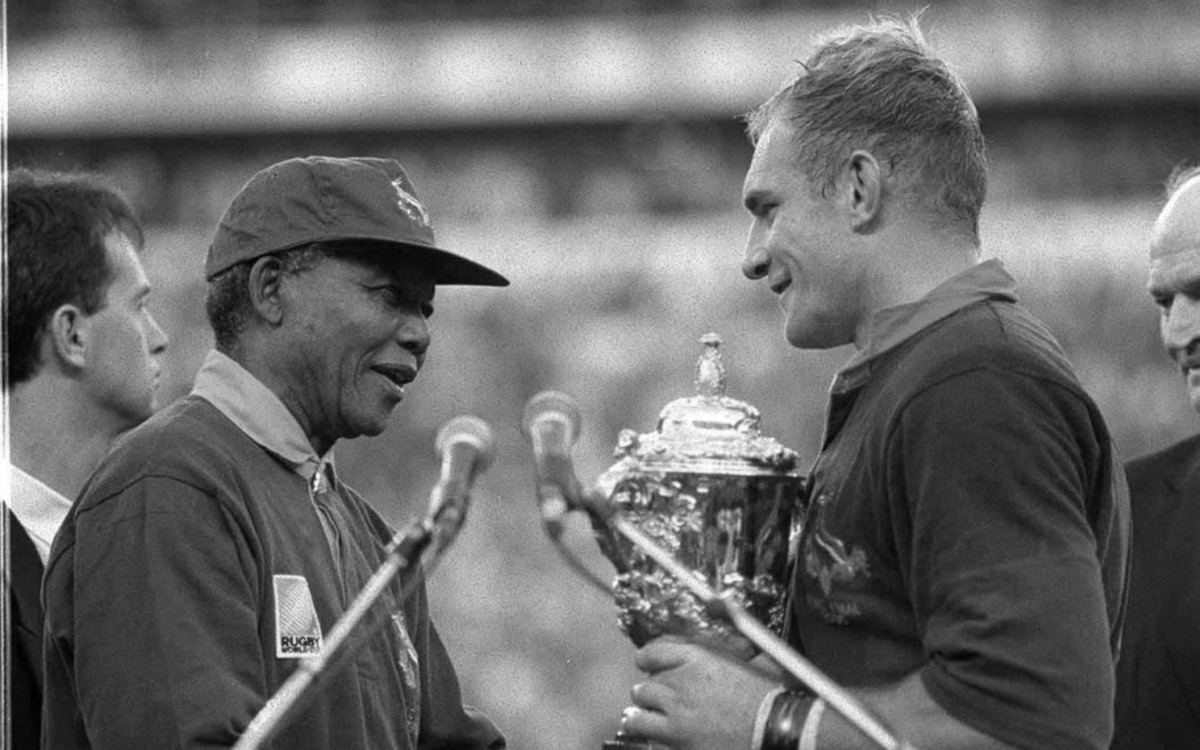The Rainbow Nation’s 1995 Rugby Triumph and the Unity of South Africa have many lessons you can learn from them. Let’s discuss.
South Africa’s triumph at the 1995 Rugby World Cup was not just a sports victory, but something more than that. This win helped to unite a people who had been bitterly divided by apartheid. This is a story of success, and its impact on the Unity of South Africa.
Table of Contents
South Africa, a once-upon-a-time divided nation
To fully comprehend the triumph, it is important to understand its circumstances. Throughout most of the twentieth century, there was apartheid.
It’s an official policy enforced by the government that kept South Africa apart. Basic rights and freedoms were denied to black South Africans, and this brought about racial tensions in the country.
In 1990, Nelson Mandela was released from prison after twenty-seven years. Then, in 1994, he became South Africa’s first black president. Mandela aimed to turn South Africa into a “Rainbow Nation.”
In simpler terms, a place where people of different races can live harmoniously together as one nation.
What to know about the 1995 Rugby World Cup and the Unity of South Africa
Rugby has always been a popular sport in South Africa, but it was traditionally seen as a white-dominated game. The 1995 Rugby World Cup, hosted by South Africa, presented an opportunity. This is like no other way to unite the nation through sports. The Springboks, South Africa’s national rugby team, became a symbol of hope and reconciliation.
Under the leadership of Captain Francois Pienaar and with the support of President Mandela, the team embarked on a journey. This changed the trajectory of South Africa’s history.
Mandela, in his attempt to scrap apartheid, wore the Springbok jersey. This gesture resonated deeply with white South Africans and began to bridge the racial divide.
South Africa won the World Cup and rewrote history
The 1995 Rugby World Cup was a historic event for South Africa. The Springboks advanced through the tournament, eventually facing New Zealand in the final match held on June 24, 1995.
The showdown was at Ellis Park Stadium in Johannesburg. The match was intensely competitive, but South Africa emerged victorious with a 15-12 win in extra time.
The victory was monumental, but what made it truly special was the sight of Nelson Mandela, wearing a Springbok jersey with the captain’s number. This powerful gesture symbolized unity and reconciliation.
Mandela’s act sent a message to the world and his fellow South Africans. He showed the country was moving forward together as one.
The impact of South Africa’s win on Unity of South Africa
The 1995 Rugby World Cup victory had a profound impact on South Africa. It marked a significant step toward national reconciliation and unity.
Captain Francois Pienaar understood that they just had to win. He led his team on a journey that transcended sports. There’s something fantastic about spot celebrations. It knows no gender or skin color. You can imagine the celebration and uproar
The fact that Nelson Mandela wore a Springbok jersey in public. It’s known as one of the most powerful symbolic acts ever displayed by him. This singular act was something that deeply moved white South Africans and began to heal their deep racial divisions.
This moment showed that sports could serve as a bridge between divided communities. It brought together people from different racial backgrounds. Also, it created a sense of shared pride and identity. The success of the Springboks helped to heal some of the wounds inflicted by decades of apartheid.
Mandela’s thoughts on South Africa’s apartheid and why the win was important
Nelson Mandela, upon regaining his freedom in February 1990, after having spent 27 years in prison, set out to reunite South Africa.
Madiba, as he was popularly called, knew that the mission was very difficult because the apartheid that existed in the country had generated a very large and irreconcilable gap between whites and blacks.
Mandela, during his years in prison, became convinced that the way forward was not an armed struggle. He believed in finding common ground and leveraging it. A great example was The Rainbow Nation’s 1995 Rugby Triumph.
In freedom, Madiba began to use one of his main gifts, persuasion. He also managed to have free elections in South Africa in 1994. These elections led him to the country’s presidency, heading the African National Congress (ANC).
Conclusion
The 1995 Rugby World Cup remains a defining moment in South Africa’s history. It showed us how sports can unite a nation and heal. You can learn a lesson from this. Sports can bring us together and build a more united and cohesive society.
So, let’s not forget the message of unity and hope it represents. Through sports and shared experiences, there’s something better for us.

